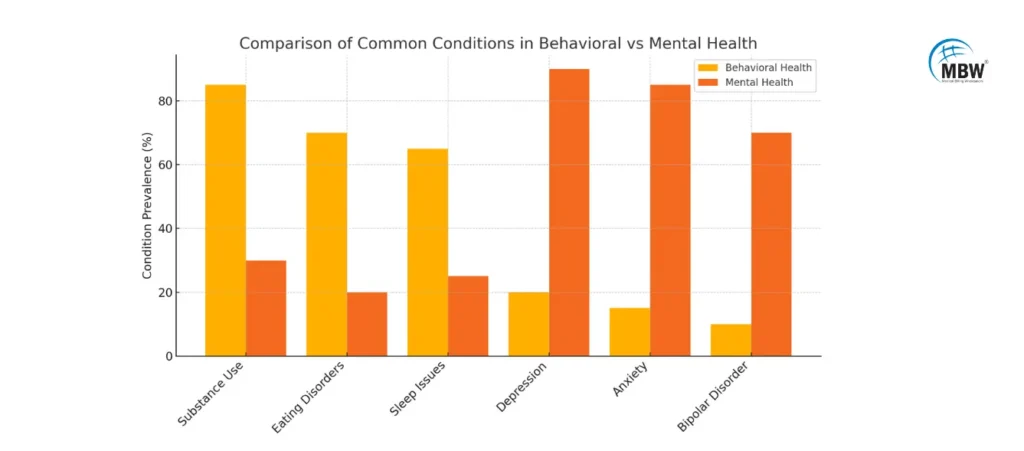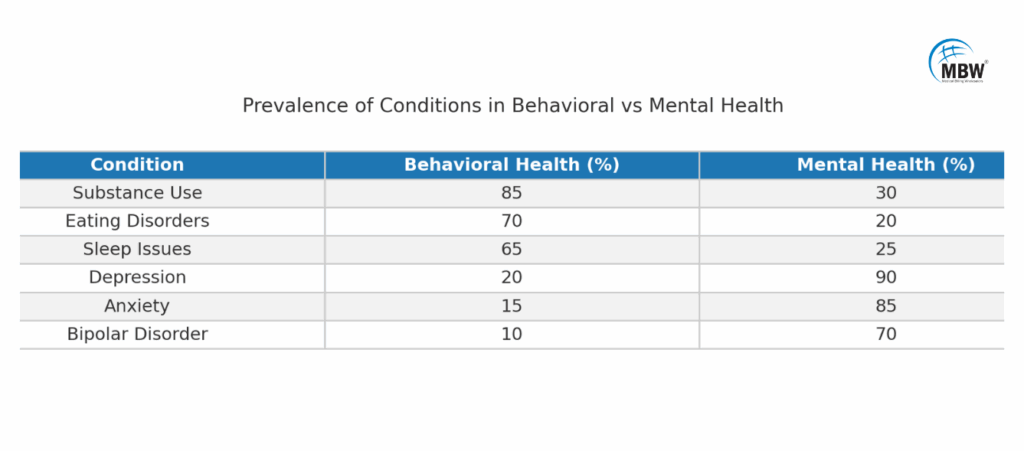Is behavioral health the same as mental health? This question might seem simple at first glance, but the answer reveals layers of nuance often overlooked. In conversations, treatment plans, and even insurance documents, the terms “behavioral health” and “mental health” are used interchangeably.
However, they reflect different approaches to well-being. Understanding these differences matters—not just for terminology’s sake, but for receiving the right care and asking the right questions in today’s complex healthcare landscape.
If you’re a provider seeking support, explore our behavioral and mental health billing services for customized RCM solutions.
What Is Behavioral Health?
Behavioral health refers to how our habits, routines, and actions affect our overall wellness. It examines the impact of lifestyle choices—such as substance use, eating behavior, exercise, and sleep—on physical and emotional health. Behavioral health also includes clinical care for issues like addiction, eating disorders, and chronic stress.
It’s broader than mental health, focusing not just on the mind but on patterns that influence both mental and physical states. Therapy under behavioral health may involve counseling, cognitive behavioral therapy (CBT), and motivational interviewing to help patients develop healthier habits.
“You can’t meditate your way out of binge-watching five seasons of chaos—behavioral health sees it all.” 🛋️📺
What Is Mental Health?
Mental health focuses on psychological and emotional well-being. It reflects how individuals think, feel, and cope with life’s challenges. When we speak about mental health, we often refer to conditions like depression, anxiety, bipolar disorder, and schizophrenia.
These conditions are diagnosed based on emotional symptoms and treated using psychotherapy, psychiatric medications, and support from trained mental health professionals. While mental health is often viewed through a clinical lens, it’s actually part of everyone’s daily life—even in the absence of illness.
For more specialized support, read our blog on top mental health billing services tailored to help practices improve collections and coding accuracy.
Behavioral Health vs Mental Health: Key Differences in Care
Though the two areas overlap, they diverge in scope and care strategies. Behavioral health is holistic, incorporating lifestyle-related conditions alongside emotional challenges. Mental health is more focused, targeting specific psychological diagnoses.
| Category | Behavioral Health | Mental Health |
|---|---|---|
| Core Focus | Habits, substance use, daily behavior | Thoughts, emotions, psychological state |
| Example Conditions | Alcohol addiction, eating disorders | Depression, anxiety, bipolar disorder |
| Treatment Providers | Counselors, coaches, therapists | Psychiatrists, psychologists |
| Common Interventions | CBT, group therapy, rehab programs | Psychotherapy, psychiatric medication |
These differences also influence the length and structure of treatment. Behavioral health care may be short-term and habit-focused, while mental health care often requires long-term engagement.

When Conditions Overlap?
It’s common for behavioral and mental health issues to co-exist. For instance, someone dealing with depression may also develop unhealthy eating or sleeping patterns. Conversely, a person struggling with substance use might develop anxiety or mood disorders over time.
Treating both requires a coordinated approach. Providers may work in tandem—addressing the emotional triggers through mental health therapy and the behavioral responses through coaching and habit-building strategies. Integrated care models are often the best solution in such cases.
Treatment Approaches and Patient Experience
Behavioral health treatments focus on modifying behavior. Techniques like CBT and DBT help patients break cycles of addiction, stress response, or self-harming behaviors. Group therapy, life coaching, and habit tracking also play key roles.
Mental health care, however, often dives deeper into thought patterns and emotions. Psychiatric care may be involved to stabilize mood disorders using medications like antidepressants or mood stabilizers.
| Treatment Type | Behavioral Health Focus | Mental Health Focus |
|---|---|---|
| Primary Goal | Change behaviors that harm health | Address emotional and psychological issues |
| Common Therapies | CBT, DBT, motivational interviewing | Talk therapy, psychiatric treatment |
| Typical Duration | Short-term or medium-term | Often long-term |
Both forms of care can be incredibly beneficial—but only when matched correctly with the patient’s condition.
Insurance and Coverage Gaps
The distinction between behavioral and mental health becomes especially important when navigating insurance policies. In the U.S., mental health parity laws require that mental health care receive the same level of insurance coverage as physical health care. However, behavioral health services—particularly those involving addiction treatment or lifestyle coaching—may face more restrictions.
According to SAMHSA, this inconsistency leads to delayed care or out-of-pocket expenses. Patients should always verify whether their behavioral or mental health needs are covered under their specific plan.
Why the Confusion Still Exists
Part of the reason these terms are confused is how they’re used in media and public policy. Intake forms, billing codes, and even healthcare websites often lump the two together. The movement toward integrated care—where behavioral and mental health professionals collaborate—has further blurred the lines.
This integration is positive for patient outcomes but can create challenges when precise language is needed, such as for insurance claims or clinical documentation.
Impact of Behavioral vs Mental Health Confusion on Patient Care
When patients don’t understand the difference, they may not know who to consult. A person with addiction may seek help from a psychiatrist when they actually need a behavioral therapist. Conversely, someone with bipolar disorder might be misdirected to a general counselor instead of receiving specialized psychiatric care.

This misalignment can delay treatment, worsen symptoms, and reduce the chances of full recovery. Our case study on achieving transformational RCM results for a California-based behavioral health provider shows how clarity in billing and service categories significantly improves revenue and care access.
“Mixing up behavioral and mental health is like going to a dentist for a haircut—wrong chair, same nervous sweat.” 😬✂️
Conclusion
So, is behavioral health the same as mental health? No—while they are closely linked, they serve different purposes in healthcare. Behavioral health focuses on how behaviors impact overall well-being, including but not limited to mental illness. Mental health is more narrowly centered on emotional and psychological function.
Distinguishing the two improves diagnosis, treatment outcomes, and communication between patients, providers, and insurance companies. A better grasp of these concepts helps patients receive the right support at the right time, making all the difference in their recovery journey.
Frequently Asked Question
1. What is the key difference between behavioral health and mental health?
Behavioral health includes lifestyle and habit-based concerns, while mental health focuses on emotional and psychological conditions.
2. Can I have behavioral health problems without a mental health condition?
Yes. Behavioral issues like addiction or poor sleep habits don’t always indicate a mental illness.
3. Are treatments for behavioral and mental health different?
They can be. Behavioral health might focus on changing habits, while mental health treatment may involve therapy and medication.
4. Is mental health part of behavioral health?
Yes. Mental health is considered a subset of the broader behavioral health domain.
